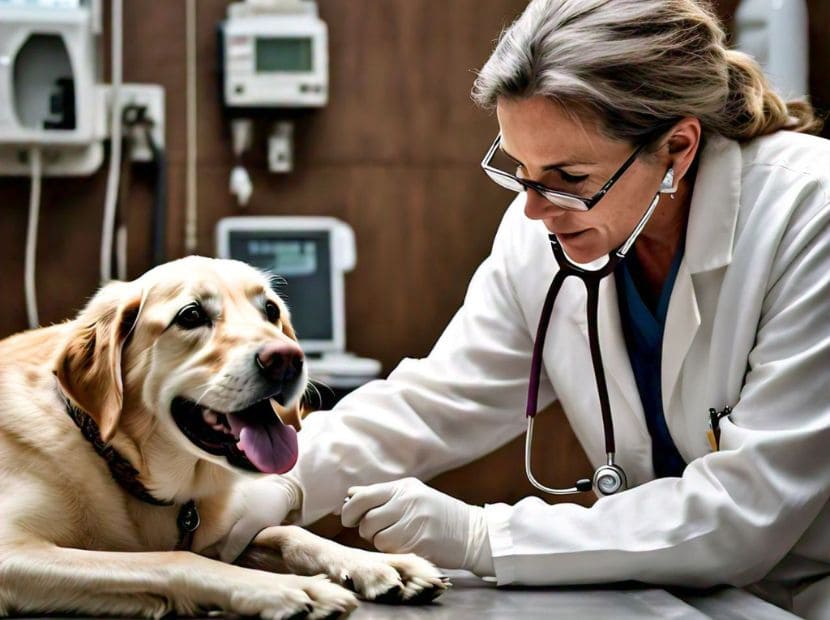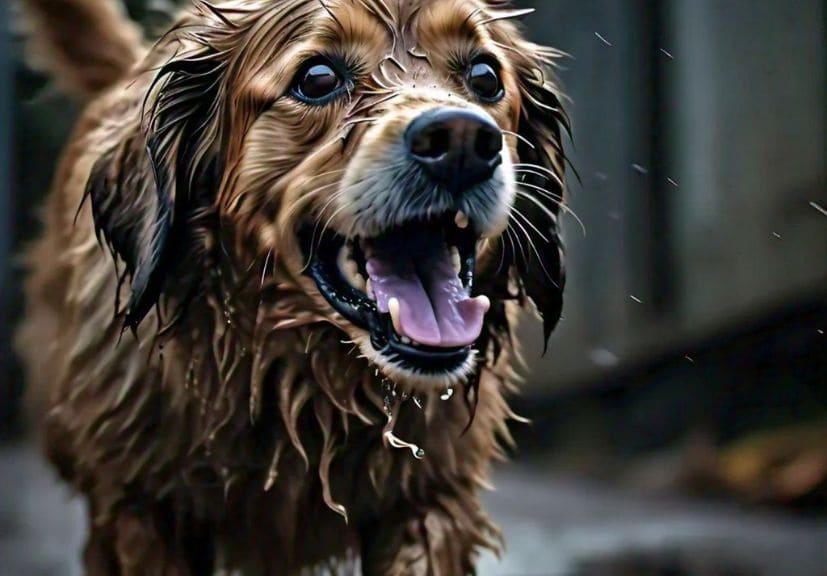Understanding Normal Breathing in Dogs
Dogs are prone to various medical conditions including respiratory problems like heavy breathing. Before we jump into why your dog may be breathing heavily, it’s important to know what “normal” breathing looks like. The normal resting rate for adult dogs is between 15 to 30 breaths per minute. Puppies tend to breathe a little faster, especially during sleep. It’s common for a puppy to breathe 100 breaths per minute while sleeping. Breeds, size, and activity levels can cause variations in breathing rates, so it’s essential to observe your dog’s natural rhythm when they’re at rest.
Rapid breathing in dogs can be concerning, especially when resting or sleeping. If you notice your dog is breathing heavily or quickly, it’s time to investigate why.
How to Measure Your Dog’s Breathing Rate?
It’s easy to check your dog’s breathing rate at home:
- Ensure your dog is resting calmly.
- Count how often their chest rises in 60 seconds (one rise and fall counts as one breath).
- If your dog is breathing faster than 30 breaths per minute at rest, this could indicate an underlying problem.
But it’s crucial to understand the difference between panting and heavy breathing. Dog panting is a normal way for your pup to cool down and regulate body temperature, but if your dog is not panting and still breathing fast, it may indicate another issue.
Common Causes of Heavy Breathing in Dogs
Heavy or rapid breathing in dogs can occur for many reasons. While some causes are benign, others may require prompt attention. Let’s explore some of the most frequent causes.
Exercise and Overexertion
After physical activities, like training or socialization, it’s normal for dogs to breathe heavily. Why do dogs breathe fast after exercise? It’s their way of cooling down. Dogs don’t sweat like humans, so panting helps them release excess body heat. If your dog has been playing, running, or engaging in any exercise, it’s natural for them to pant and breathe faster.
However, if your dog is breathing fast but not panting long after the activity has ended or if it seems distressed, it could indicate a problem. Overweight dogs, in particular, may experience labored breathing even with light activity. This leads to the question, do dogs breathe faster when overweight? Obesity can strain the respiratory system, causing heavy and fast breathing.
Heat and Overheating
Another common reason for heavy, fast breathing in dogs is heat. Dogs pant to cool themselves down when hot, but they can develop heatstroke if exposed to high temperatures for too long. This is more common in brachycephalic breeds (those with flat faces, like Pugs and Bulldogs) since they have a harder time cooling themselves.
The signs of heatstroke include:
- Excessive panting
- Dog breathing heavy and fast
- Red gums
- Lethargy
- Vomiting
If your dog is breathing rapidly while resting or appears exhausted, it’s time to take action. Move them to a cool, shaded area, provide water, and seek veterinary care immediately. Heatstroke is an emergency; prompt action can save your dog’s life.
Excitement or Anxiety
Have you ever noticed your dog panting heavily when you pull out its leash or when it sees something exciting, like a favorite toy? Dogs breathe fast when they’re excited, and it’s a completely normal response to stimuli. Why is my dog breathing rapidly during these moments? Their body responds to excitement, happiness, or even mild anxiety.
On the flip side, anxiety can also cause dogs to breathe fast. Stressors like thunderstorms, fireworks, or separation anxiety might lead to rapid breathing in dogs. If your dog regularly pants during stressful situations, try to create a calm environment or talk to your vet about anxiety-relieving options.
Obesity

An often overlooked cause of heavy breathing is obesity. If your dog carries extra weight, it can affect their ability to breathe properly, even while resting. Why is my dog breathing fast when simply lying down or relaxing? Obesity can place additional pressure on their heart and lungs, leading to labored breathing. A dog’s rapid breathing while resting can sometimes be traced back to excess body weight.
Keeping your dog at a healthy weight can prevent breathing issues and other health problems, such as joint pain, diabetes, and heart disease. Regular exercise and a balanced diet are crucial for maintaining respiratory health.
Puppies and Rapid Breathing
Is my puppy breathing fast while sleeping something to worry about? Many new dog owners are surprised by how quickly puppies breathe, especially during sleep. In most cases, a puppy breathing 100 breaths per minute while sleeping is perfectly normal. Puppies have higher respiratory rates than adult dogs because they’re growing rapidly, and their bodies need more oxygen to support that growth.
If your puppy’s breathing seems labored, or you notice fast breathing in dogs and other signs like coughing, lethargy, or vomiting, it’s worth consulting your vet to rule out any underlying issues.
Medical Conditions That Cause Heavy Breathing
If your dog is breathing heavily without a clear external cause, it might be due to an underlying medical condition. Let’s explore common health issues that can lead to rapid respiration in dogs.
Respiratory Issues
Your dog’s respiratory system can be affected by conditions like:
- Pneumonia
- Bronchitis
- Lung disease
In these cases, a dog breathing fast might be accompanied by other symptoms like coughing, wheezing, or lethargy. One particular concern is tracheal collapse, which is common in smaller breeds like Chihuahuas and Yorkies. A collapsing windpipe can cause a dog to breathe heavily and fast, along with frequent coughing. In severe cases, it can lead to a dog breathing fast but not panting, requiring immediate medical intervention.
Lung infections or allergies can also lead to labored breathing. If you notice your dog breathing fast through the nose, sneezing, or wheezing, allergies may be to blame. Consult your vet if your dog shows signs of respiratory distress.
Heart Disease
Another serious cause of rapid breathing in dogs is heart disease, particularly congestive heart failure (CHF). When the heart fails to pump blood effectively, fluid can accumulate in the lungs, making it difficult for your dog to breathe. This leads to the dog breathing heavily and showing other signs like coughing, fainting, or lethargy.
If your dog is experiencing a dog breathing fast at rest, or you notice any signs of heart disease, your vet may recommend an echocardiogram to check for heart function.
Allergic Reactions
Canine allergies can cause dogs to breathe fast. Environmental allergens, like pollen or dust, can irritate the airways, leading to a fast respiratory rate in dogs. Food allergies may also cause dogs breathing fast and have shallow mouth closed.
Severe allergic reactions, known as anaphylaxis, can cause heavy breathing in dogs. If your dog’s face appears swollen or struggling to breathe, seek emergency care immediately.
Pain or Injury
Why is my dog breathing fast while lying down? Dogs often try to mask their pain, but they show discomfort through their breathing. Heavy, fast breathing in dogs can indicate pain from an injury, such as a broken rib or internal trauma. Pain can sometimes trigger a dog breathing heavy and fast when it seems otherwise normal.
Toxins and Poisoning
If your dog ingests something toxic, such as chocolate, antifreeze, or certain plants, their body may react with rapid breathing. Symptoms of poisoning include dog breathing fast, vomiting, seizures, and restlessness. Immediate veterinary attention is necessary in these situations.
When Should You Be Concerned About Your Dog’s Breathing?

So, when should you worry about your dog’s fast breathing? Here are some signs that suggest your dog’s breathing patterns require immediate attention:
- Blue or pale gums
- Dog breathing fast while resting or breathing heavily for no apparent reason
- Dog breathing rapidly while sleeping or unable to calm down
- Wheezing, coughing, or gasping for air
- Heavy breathing in dogs accompanied by lethargy, vomiting, or collapse
If you notice any of these symptoms, don’t hesitate to consult your vet. Fast, heavy breathing in dogs can signal serious conditions like heart failure, respiratory infections, or heatstroke.
Diagnosing Breathing Issues in Dogs
When you bring your dog to the vet for breathing issues, they will perform a physical exam to rule out common problems. If the cause of the fast breathing in dogs isn’t immediately clear, they may recommend additional tests, such as:
- Chest X-rays to check for fluid buildup, tumors, or infections
- Blood tests to evaluate for infections or organ dysfunction
- Echocardiogram to assess heart function if heart disease is suspected
Diagnosing the root cause of a dog breathing heavy is crucial for determining the best treatment plan.
Treatment Options for Heavy Breathing in Dogs
The treatment for rapid breathing in dogs depends on the underlying cause. Let’s break down the most common solutions.
Environmental or Emotional Causes
Dogs are usually considered among the animals with good environmental impact but proper training is a condition. Sometimes, our environment can make them breathe fast. If your dog’s heavy breathing is due to excitement, heat, or anxiety, the solution is often simple: help your dog cool down, provide water, and reduce stress. If your dog is breathing fast through the nose while sleeping, this may be due to excitement or dreaming, which typically resolves independently.
Medical Treatments
For more serious conditions like respiratory infections, heart disease, or allergies, your vet may prescribe:
- Antibiotics or anti-inflammatories for infections
- Heart medications like diuretics for congestive heart failure
- Antihistamines for allergic reactions
Surgery may be required for severe conditions like tracheal collapse or tumors.
Preventative Care
The best ways to prevent breathing issues are to keep your dog at a healthy weight, provide regular exercise, and schedule annual vet visits. If your dog is prone to heavy breathing, work with your vet to monitor its respiratory health over time.
Conclusion
Rapid or heavy breathing in dogs is not always a cause for concern, but it’s crucial to understand the reasons behind it. From normal responses to exercise and excitement to more serious health conditions like heart disease or respiratory issues, knowing the difference can help you keep your dog safe and healthy.
If you ever wonder why your dog is breathing fast, don’t hesitate to consult your vet. Early detection and treatment of breathing problems in dogs can improve their quality of life.
https://www.merckvetmanual.com/
FAQs
Is it normal for puppies to breathe fast?
Yes, puppies often breathe quickly, especially during sleep. However, consult your vet if you notice labored breathing or other concerning symptoms.
Why is my dog breathing fast while sleeping?
Dogs may breathe fast while sleeping due to dreaming, excitement, or overheating. This could indicate a health issue if they continue breathing rapidly after waking.
Why does my dog breathe fast while resting?
Fast breathing while resting can indicate anxiety, pain, or an underlying medical condition like heart disease or respiratory issues. Consult your vet if this behavior persists.
What does it mean when a dog breathes fast?
Fast breathing in dogs can result from exercise, heat, excitement, or stress, but it can also indicate more serious conditions like heart failure, lung disease, or an allergic reaction.
How fast should a dog breathe?
A healthy adult dog should take 15 to 30 breaths per minute while at rest. Puppies may breathe faster, especially during sleep, sometimes up to 100 breaths per minute.




